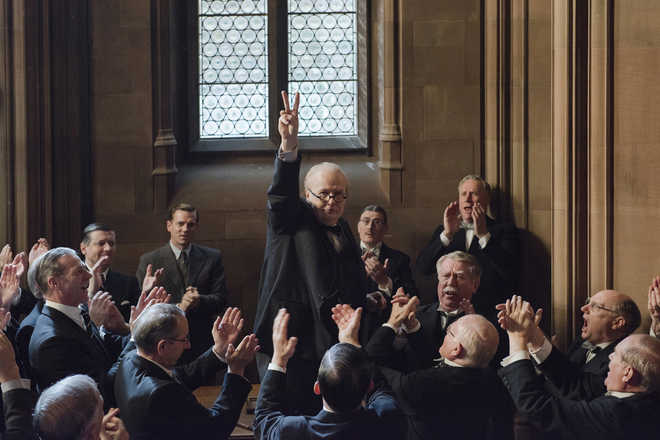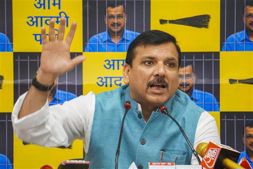
Tough call: Gary Oldman impresses with an impeccable performance as the British Prime Minister
Navnee Likhi
“You ask, what is our policy. I will say: it is to wage the war and use all our might.”
— Winston Churchill
Known as a man of action at the time of critical situation during World War II, Winston Churchill, then Prime Minister of Great Britain, fearless as he was, demanded action from all others involved in waging war. He evolved a strategy of three Rs: to resist, rearm and retaliate. British film director Joe Wright’s movie Darkest Hour is based on events during World War II. Within days of becoming the Prime Minister, he faced the most turbulent situations calling for crucial decisions. The choice was between negotiating the peace treaty and fighting the Nazi Germany, when its forces were unstoppable in Europe. He stood firm to fight for his ideals of liberty and freedom of his nation. The opposing factors he faced were an unprepared public mind — the skeptical King George Vl and members of his own party plotting against him. In the darkest hour, Churchill had to fight against incredible odds.
Tensions mounted for the beleaguered British Prime Minister in the days leading up to allied landings in Normandy, France, in June 1944. Not wanting to repeat mistakes of World War I, he was reluctant to start large-scale campaigns. He had severe differences of opinion on war strategies with US General Dwight Eisenhower and Field Marshal Bernard Montgomery. During these troubled times, Churchill received full support of his wife. With her shrewdness, she halted his physical and mental collapse. Clementine used her subtle wit, often teasing him to puncture his over-inflated ego.
As he talked to his political opponents about the threat of war and the futility of negotiations of peace, his point was a masterpiece of satire, such as, “You cannot reason with a tiger when your head is in his mouth”. And in one of the scenes, he thundered, “Do not interrupt me when I’m interrupting you”.
The film opened inside the British Parliament, laying the film’s title card over a bird’s-eye view of the House of Commons. Lit by pale sunbeam, a pallid chamber is full of hundreds of parliamentarians seeking resignation of Neville Chamberlain, the then British Prime Minister. It’s 1940 and Britain was losing the battle to stop the annexation of Europe with Nazis perilously close to invading England. The current Prime Minister and peace advocate Neville Chamberlain had lost the vote of confidence. Despite being unpopular, even within his own party, Churchill got a signal to lead the nation at its most vulnerable. He was a man of conviction and the movie painted him as a lone politician willing to defy Hitler. Antony MC Carter’s script was eloquently theatrical and it matched Gary Oldman’s style of acting.
The opposition party members, King George VI and his party’s original choice Viscount Halifax, didn’t trust him, and both were out to undermine him at any cost. The film chronicled Churchill’s initial belief in keeping Germany’s advances into Britain as quietly as possible in order to avoid panic among the British but this lie only angered his political allies. Filling his war cabinet with political rivals created an unruly coalition. Churchill decided to rescue the 3,00,000 stranded British and allied troops at Dunkirk in Operation Dynamo. This brought some relief and he began to see a way to bring not only the nation’s warring political factions but also people together. However, his opponents pressurised him to agree to talk peace with Italy’s leadership Benito Mussolini. Churchill had his own self-confidence issues. His secretary Elizabeth Layton, a young quiet but loyal typist to whom he dictated his letters and speeches, was his confidante, even in matters of war strategy.
Keeping the pace of the story moving, there were some unexpected emotional moments. In one of the scenes, Churchill decided to take a train to parliament for the first time. He quizzed the people he met on the train, whether Britain should negotiate a peace treaty or fight for the control of their island. Persons travelling voiced their anger that anyone could succumb to Hitler: however, a young girl interrupted saying that they should fight, bringing tears to his eyes. He got off at the stop, felt re-energised for the fight ahead. His secretary told him about her brother who was fighting in France but never made to relative safety. This revelation stopped Churchill in his tracks as human toll of war began to truly wear him down. There was a strong visual collaboration in cinematography by Bruno Delbonnel. The set designer Sarah Wood innovated to bring familiar World War II’s events to life.
In this tense verbose drama, Joe Wright injected some lighter moments. As Churchill was shown sitting in his room lighting his signature cigar and having whisky, King George VI walked into his room and asked him, “How do you manage to drink during the day?
“Practice”, murmured Churchill, adding “it stirs one’s imagination”. He’s also shown cheering a rugby game. Churchill’s pain, insecurity, at times, and quiet fear of war seem unfathomable.
Darkest hour hit soaring heights with Gary Oldman in the title role: hidden behind fake jowls and receding hairline, he delivered an impeccable performance, portraying Churchill in a role that was honest, heartfelt and magical.



























